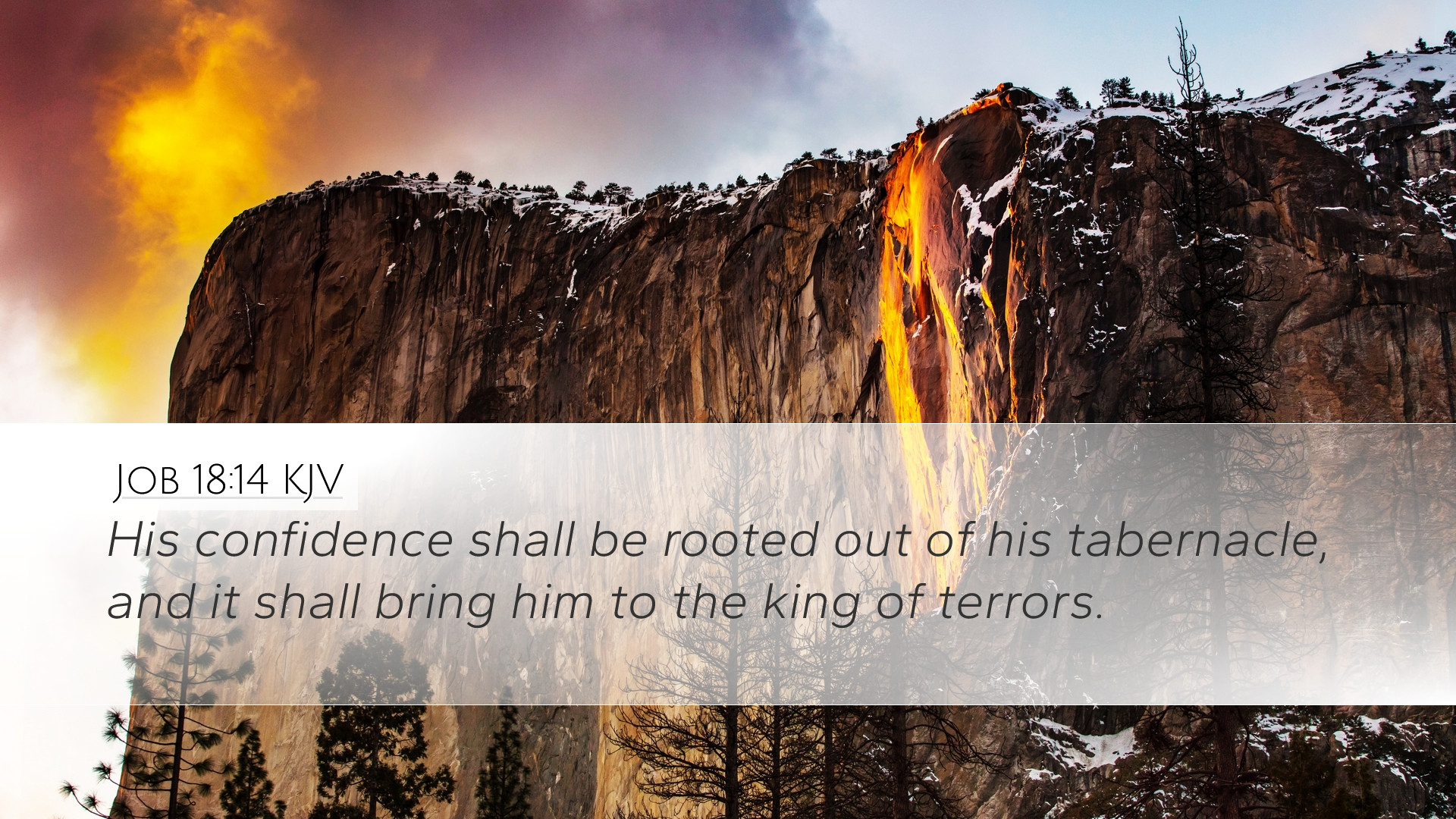Old Testament
Genesis Exodus Leviticus Numbers Deuteronomy Joshua Judges Ruth 1 Samuel 2 Samuel 1 Kings 2 Kings 1 Chronicles 2 Chronicles Ezra Nehemiah Esther Job Psalms Proverbs Ecclesiastes Song of Solomon Isaiah Jeremiah Lamentations Ezekiel Daniel Hosea Joel Amos Obadiah Jonah Micah Nahum Habakkuk Zephaniah Haggai Zechariah MalachiJob 18:14
Job 18:14 KJV
His confidence shall be rooted out of his tabernacle, and it shall bring him to the king of terrors.
Job 18:14 Bible Commentary
Commentary on Job 18:14
Job 18:14 says, "His confidence shall be rooted out of his tabernacle, and it shall bring him to the king of terrors." This verse is part of a discourse by Bildad the Shuhite, one of Job's friends, who attempts to illustrate the fate of the wicked, contrasting with Job's ailing condition. The depth of this verse invites a thorough exploration through various public domain commentaries, enriching our understanding and application.
Contextual Analysis
In this passage, Bildad is depicting the inevitable downfall of those who oppose God or lead lives devoid of righteousness. He uses potent imagery to characterize spiritual desolation and the ultimate fate that awaits the unrepentant.
Matthew Henry's Commentary
Matthew Henry emphasizes the dual application of this verse: 1) It speaks to the condition of sinners, illustrating how their trust is in vain and will ultimately lead to despair, and 2) It serves as a warning to the pious who may stray from their faith. Henry astutely points out that "his tabernacle," which symbolizes one's life and home, is fundamentally destabilized when not tethered to divine assurance.
- Confidence Rooted Out: Henry remarks that misplaced confidence must ultimately be uprooted, especially when it relies on earthly securities rather than God. Bildad suggests that, like a house built on sand, a sinner's security will not withstand the storms of adversity.
- The King of Terrors: Henry identifies "the king of terrors" as death itself, which becomes the final adversary to those who live without God. This phrase evokes a profound sense of fear that haunts those who are estranged from divine grace.
Albert Barnes' Commentary
Albert Barnes provides further insights, expounding upon the figurative language employed by Bildad. He interprets "his tabernacle" as the inner sanctum of a man, where his hopes and dreams reside. Barnes maintains that a fundamental reality of human existence is that true confidence must necessarily be rooted in God to withstand life's trials.
- The Destruction of Hope: According to Barnes, this verse illustrates the way wickedness leads inevitably to despair. The unrepentant heart, while seemingly fortified by earthly elements, eventually crumbles under spiritual turmoil.
- Death as the Ultimate Conqueror: Readers are reminded of the ultimate destiny of man, which is death. The term "king of terrors" encapsulates the terror that accompanies death when one lacks hope in God’s salvation.
Adam Clarke's Commentary
Adam Clarke brings out the nuances of this verse, suggesting that Bildad’s words reflect a mixture of truth and misguided theology. He critiques the notion that all calamities are directly attributable to one’s sin, which is an oversimplification of divine justice.
- Faith Substantiated by Evidence: Clarke posits that Bildad’s view attempts to illustrate that abhorring sin isn't merely a practical matter; it is also deeply theological. The faith rooted in God acts as an anchor against the tides of adversity.
- The Inevitability of Judgment: Clarke concurs with the notion that divine judgment is inescapable for those who turn away from God. They cannot circumvent the reality that one’s eternal fate is intertwined with their choices made during earthly existence.
Theological Implications
This verse warrants a critical reflection on the themes of trust, existence, and mortality within the Christian faith. The juxtaposition of the righteous life against the fate of the wicked speaks volumes to the moral structure within which believers operate.
- Trust in Divine Providence: It is essential to appreciate that confidence founded on God remains unshakeable, even amidst tribulations. The righteous may encounter suffering; however, their ultimate destiny is salvation, a stark contrast to the despair of the wicked.
- Eternal Consequences: As Bildad’s declaration reveals, the fate tied to one’s earthly actions has eternal ramifications. Understanding this encourages a deeper reverence for moral choices and the underlying spiritual convictions they represent.
Conclusion
Job 18:14 serves as both a warning and a prompt for introspection regarding the nature of human confidence and reliance. Through the synthesis of insights from Matthew Henry, Albert Barnes, and Adam Clarke, we arrive at a multi-faceted interpretation of this verse. Meanwhile, it reiterates the profound truth that true security and hope lie only in the divine promise of God—a lesson as relevant today as in the age of Job.


